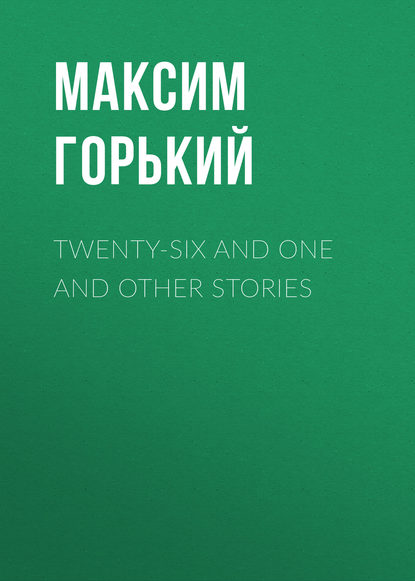По всем вопросам обращайтесь на: info@litportal.ru
(©) 2003-2024.
✖
Twenty-six and One and Other Stories
Настройки чтения
Размер шрифта
Высота строк
Поля
"We are those who throw our nets
Upon dry banks,
Upon barns and stables!"
"Have you ever seen any of that kind?" asked Tchelkache, looking ironically at him, and thinking that this honest boy must be very stupid.
"No, I've never seen any; but I've heard them spoken of."
"Do you like them?"
"Why not? They are fearless and free."
"Do you feel the need of freedom? Do you like freedom?"
"How could I help liking it? One is his own master, goes where he likes, and does what he pleases. If he succeeds in supporting himself and has no weight dragging at his neck, what more can he ask? He can have as good a time as he likes provided he doesn't forget God."
Tchelkache spat contemptuously and interrupted the boy's questions by turning his back to him.
"Look at me, for instance," said the other, with sudden animation. "When my father died, he left little. My mother was old, the land worn out, what could I do? One must live. But how? I don't know. A well-to-do family would take me in as a son-in-law, to be sure! If the daughter only received her share! But no! The devil of a father-in-law never wants to divide the property. So then, I must toil for him.. a long time.. years. Do you see how it stands? While if I could put by a hundred and fifty rubles, I should feel independent and be able to talk to the old man. 'Will you give Marfa her share?' No! 'All right! She's not the only girl in the village, thank God.' And so I'd be perfectly free, my own master. Yes!" The lad sighed. "As it is, there's nothing for it but to go into a family. I've thought that if I were to go to Koubagne, I'd easily make two hundred rubles. Then I should have a chance for myself. But no, nothing has come my way, I've failed in everything! So now it's necessary to enter a family, be a slave, because I can't get along with what I have – impossible! Ehe!."
The lad detested the idea of becoming the husband of some rich girl who would remain at home. His face grew dull and sad. He moved restlessly about on the ground; this roused Tchelkache from the reflections in which his speech had plunged him.
Tchelkache felt that he had no more desire to talk, but he nevertheless asked:
"Where are you going, now?"
"Where am I going? Home, of course!"
"Why of course?.. Perhaps you'd like to go to Turkey."
"To Turkey?" drawled the boy. "Do Christians go there? What do you mean by that?"
"What an imbecile you are!" sighed Tchelkache, and he again turned his back on his interlocutor, thinking this time that he would not vouchsafe him another word. This robust peasant awakened something obscure within him.
A confused feeling was gradually growing up, a kind of vexation was stirring the depths of his being and preventing him from concentrating his thoughts upon what he had to do that night.
The lad whom he had just insulted muttered something under his breath and looked askance at him. His cheeks were comically puffed out, his lips pursed up, and he half closed his eyes in a laughable manner. Evidently he had not expected that his conversation with this moustached person would end so quickly and in a manner so humiliating for him.
Tchelkache paid no more attention to him. Sitting on the block, he whistled absent-mindedly and beat time with his bare and dirty heel.
The boy longed to be revenged.
"Hey! Fisherman! Are you often drunk?" he began; but at the same instant the fisherman turned quickly around and asked:
"Listen, youngster! Do you want to work with me to-night? Eh? Answer quick."
"Work at what?" questioned the boy, distrustfully.
"At what I shall tell you.. We'll go fishing. You shall row.."
"If that's it.. why not? All right! I know how to work.. Only suppose anything happens to me with you; you're not reassuring, with your mysterious airs.."
Tchelkache felt a burning sensation in his breast and said with concentrated rage:
"Don't talk about what yon can't understand, or else, I'll hit yon on the head so hard that your ideas will soon clear up."
He jumped up, pulling his moustache with his left hand and doubling his right fist all furrowed with knotted veins and hard as iron; his eyes flashed.
The lad was afraid. He glanced quickly around him and, blinking timidly, also jumped up on his feet. They measured each other with their eyes in silence.
"Well?" sternly demanded Tchelkache.
He was boiling over with rage at being insulted by this young boy, whom he had despised even when talking with him, and whom he now began to hate on account of his pure blue eyes, his healthy and sun-burned face and his short, strong arms; because he had, somewhere yonder, a village and a home in that village; because it had been proposed to him to enter as son-in-law in a well-to-do family, and, above all, because this being, who was only a child in comparison with himself, should presume to like liberty, of which he did not know the worth and which was useless to him. It is always disagreeable to see a person whom we consider our inferior like, or dislike, the same things that we do and to be compelled to admit that in that respect they are our equals.
The lad gazed at Tchelkache and felt that he had found his master.
"Why." said he; "I consent. I'm willing. It's work that I'm looking for. It's all the same to me whether I work with you or someone else. I only said that because you don't seem like a man that works.. you are far too ragged. However, I know very well that that may happen to anyone. Have I never seen a drunkard? Eh! How many I've seen, and much worse than you!"
"Good! Then you consent?" asked Tchelkache, somewhat mollified.
"I, why yes, with pleasure. Name your price."
"My price depends upon the work. It's according to what we do and take. You may perhaps receive five rubles. Do you understand?"
But now that it was a question of money, the peasant wanted a clear understanding and exacted perfect frankness on the part of his master. He again became distrustful and suspicious.
"That's scarcely to my mind, friend. I must have those five rubles in my hand how."
Tchelkache humored him.
"Enough said, wait a little. Let us go to the tavern."
They walked side by side along the street; Tchelkache twisting his moustache with the important air of an employer, the lad submissively, but at the same time filled with distrust and fear.
"What's your name?" asked Tchelkache.
"Gavrilo," replied the lad.
When they had entered the dirty and smoky ale-house Tchelkache went up to the bar and ordered, in the familiar tone of a regular customer, a bottle of brandy, cabbage soup, roast beef and tea, and, after enumerating the order, said briefly: "to be charged!" To which the boy responded by a silent nod. At this, Gavrilo was filled with great respect for his master, who, despite his knavish exterior, was so well known and treated with so much confidence.
"There, let us eat a bite, and talk afterward. Wait for me an instant,
I will be back directly."
He went out. Gavrilo looked around him. The ale-house was in a basement; it was damp and dark and reeking with tobacco smoke, tar and a musty odor. In front of Gavrilo, at another table, was a drunken sailor, with a red beard, all covered with charcoal and tar. He was humming, interrupted by frequent hiccoughs, a fragment of a song very much out of tune. He was evidently not a Russian.
Behind him were two ragged women from Moldavia, black-haired and sun-burned; they were also grinding out a song.

















